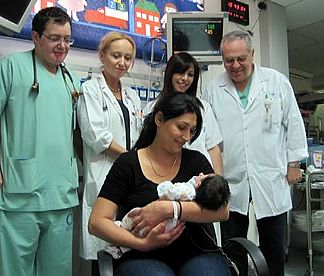About two and a half weeks ago Tali Yakar, a resident of Hadera, came to give birth to her second daughter at the Hillel Yaffe Medical Center. The birth took place in a timely manner and quickly, and nobody expected the drama that ensued during the birth: a rare complication of the combination between inhalation of meconial fluid (amniotic fluid) and the GBS bacterium, which endangered the life of her daughter, Eliah.
Two and a half weeks after the birth, just before being released from the hospital with a healthy baby in their arms, Tali recounts: "It was my 40th week of pregnancy, and the previous night I came down with a fever. I decided to go to the Maternity Ward of the Hillel Yaffe Medical Center."
Tali was immediately transferred to a delivery room, and went into normal labor, while the staff was beginning antibiotic treatment due to the fever and because she was a carrier of the GBS bacterium (a bacterium that resides in the vagina in a "silent" manner, but can be virulent for the baby when passing through the birth canal during labor).
"The birth was a joy – fast, pleasant, and the midwife, Tiki Magnzi, was kind and helped me the entire way," recounts Tali, "But immediately afterwards, I suddenly see the nurse requesting that the pediatrician be quickly called in. Within seconds, Dr. Elad Eichenwald arrived from the Neonatal Intensive Care Unit and took the newborn baby. It turned out that she drank and inhaled meconial fluid into her lungs and that she had to undergo treatment."
But that was just the beginning. While tiny Eliah was undergoing treatment to pump out the meconial fluid, the attending staff noticed that the amniotic fluid was especially turbid, indicative of excessive drinking, which is usually fatal for the baby.
"From the moment the baby was born it was ventilated and several quick fluid extractions were performed. A material known as a surfactant was injected into the pharynx, in order to aid her breathing, and later on a special gas known as NO," explains Dr. Michael Feldman, Director of the Newborn and Neonatal Care Department of the Hillel Yaffe Medical Center. "Her lungs were essentially closed. This apparently, due to the fever the mother suffered, caused the baby to suffer from stress in the womb that was expressed as inhalation of excretions in the amniotic fluid into the pharynx, while still in the womb, in abnormal amounts. This is a rare and complex situation in and of its own. Moreover, the GBS bacterium was also involved in the situation, a particularly virulent bacterium for babies. Tali received antibiotics, as is customary, when she was already in the delivery room, but the birth was very fast, and therefore the baby also required intense antibiotic administration –due to a rare combination of bacteria in the blood and very severe breathing problems."
"The staff was very kind and gave us encouragement the entire time, but the first days were critical," recounts Tali, "nobody even mentioned the word 'improvement,' and all that we could do was hope that she would recover."
About five days after the birth a small improvement began, and then a long awaited stabilization, and finally little Eliah was disconnected from all the machines she was connected to and began to breathe on her own.
About two and a half weeks afterward, yesterday, Monday, Eliah was released from the Neonatal Intensive Care Unit and returned home with her parents.
"She is a charming and vibrant baby," Dr. Feldmand added, " if it was not for this rare condition during the birth, she would have been home long ago. I am happy that she was discharged and wish them much health."
And the Yakar couple? All they do is praise the staff in the Delivery Room and the Newborn and Neonatal Care Department, who stood by them the whole time. "When I was in the Delivery Room I felt that there was a skilled and professional team by my side," says Tali Yakar and summarizes: "Me and my husband have no doubt – they saved our daughter."
The GBS bacterium and ingestion of meconial fluid: general information
What is the GBS bacterium?
It is a Group B Streptococcus bacterium, located in the vagina/birth canal in a "silent" manner and is inactive in many women. Its presence doesn't account for any threat during one's life or during labor, but it can be dangerous to the baby during labor when it passes through the birth canal. In Israel the GBS infection rate among children is not common.
What is meconial fluid?
Meconial fluid is amniotic fluid that is mixed with meconium, the first stool that the baby excretes immediately after birth. In cases of fetal distress, the fetus can sometimes excrete it into the amniotic fluid in the uterus and inhale this fluid into the lungs, a condition that can endanger the fetus' health and requires immediate medical intervention.











.jpg?BannerID=39)

